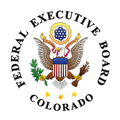COLORADO FEDERAL EXECUTIVE BOARD
COMMUNICATION | COORDINATION | COLLABORATION
Cornerstone for Strategic Partnering in Government
COLORADO FEDERAL EXECUTIVE BOARD
The Denver Federal Executive Board (DFEB) was reauthorized as the Colorado Federal Executive Board (CFEB) on January 28, 2010. The CFEB Executive Committee determined that a statewide expansion was necessary to accommodate the growth in the number of federal agencies and employees throughout the State of Colorado. The CFEB now serves over 250 federal field offices, 53,000 civilian federal employees, and 40,000 military personnel at six military installations throughout the state.
The CFEB Executive Committee and Program Director oversee the councils, committees, initiatives, programs, and services. CFEB priorities are developed in response to local agency issues and needs as well as Presidential Directives, Executive Orders, special initiatives, and new laws and regulations. The CFEB’s role as a communication conduit and a meeting point for a variety of agencies – each with a different mission – is critical to a more effective government.
FY 2024 CFEB EXECUTIVE COMMITTEE
OFFICERS
CHAIR | Cindy Terwilliger, DOT FTA
FIRST VICE CHAIR | Julie Bednar, DOI IBC
SECOND VICE CHAIR | Vacant
IMMEDIATE PAST CHAIR | Mark Stevenson, DoD DHA
MEMBERS
Erik Amundson, HUD
Dr. David Bowling, NTSB
Howard Cantor, DOI/ONRR
Katherine Fox, FEMA Region 8
Denise Maes, GSA Region 8
John Hannigan, HHS CMS
Cheryl Kennedy, USDA FNS
Molly Kocialski, DOC USPTO
Adam Kowalski, DHS FPS
Denise Maes, GSA Region 8
Kim Rice, DOJ
Paul Sherbo, VA
Jon Smart, NORAD/NORTHCOM, J49
____________________________________________________________________________________________________________________
CFEB STAFF
Program Director | Vacant
Program Specialist | Jeff Conn
FEDERAL EXECUTIVE BOARDS
A NATIONAL NETWORK
Since their inception by Presidential Directive in 1961, Federal Executive Boards (FEBs) have served as models for partnership-based government by identifying common ground and building cooperative relationships across agency lines. FEBs have a long history of establishing and maintaining valuable communication links to prepare for, and respond to, local and national emergencies. We emphasize improved economy, efficiency, and substantive effectiveness of the Executive Branch through strengthened communications and implementation of Washington, DC initiatives and policies, while identifying and providing local training programs, employee development, shared resources, and outreach to the communities in which each FEB resides. FEBs are a catalyst for collaboration and work to identify and advance common issues that impact the Federal community at large through efficient and effective use of limited resources.
Denver was one of the original ten cities authorized to establish Federal Executive Board in 1961. The other cities included Atlanta, Boston, Chicago, Dallas, New York, Philadelphia, St. Louis, San Francisco, & Seattle. There are now twenty-eight Federal Executive Boards across the nation in locations with a high concentration of Federal agencies and Federal employees. With approximately 85% of the Federal workforce outside of Washington DC, the Federal Executive Boards play an important role in being the catalyst for communication, collaboration, and cooperation among the field agencies and in developing intergovernmental partnerships that benefit the citizens we serve.
More information on the national network and links to each FEB web site are at www.feb.gov
FY2021 NATIONAL FEB ANNUAL REPORT
CFEB ANNUAL REPORT
CFEB ANNUAL PLAN
CFEB STAFF
Program Director | Vacant
Jeff Conn, Program Specialist | jeffrey.conn@opm.gov
PO Box 25567
Lakewood CO 80225-0567
303 202 4588
